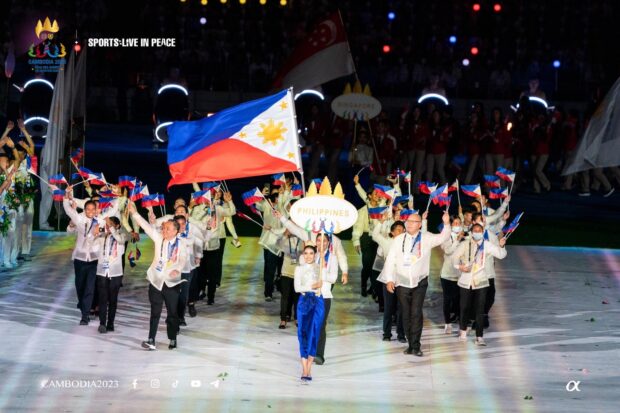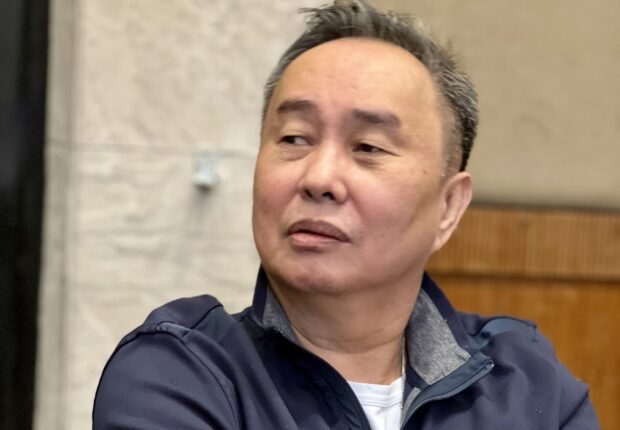
The delegation from the Philippines parades during the opening ceremony of the 32nd Southeast Asian Games (SEA Games) at the Morodok Techo National Stadium in Phnom Penh on May 5, 2023. –CAMBODIA 2023 PHOTO
PHNOM PENH, CAMBODIA—“Kun Khmer,” what?
The abundance of indigenous sports in the calendar of the 32nd Southeast Asian Games here may have sowed confusion among casual sports fans as to what kind of competition they resemble. But it also allowed the host country to reap golden benefits.
That’s not happening from the 2025 edition in Thailand onwards.
Philippine Olympic Committee (POC) president Abraham “Bambol’’ Tolentino said the SEA Games Federation recently approved a measure that would limit indigenous sports to just four starting in Thailand while guaranteeing maximum exposure for Olympic events.
“This was one of the many proposals I have brought up and was approved. We set a minimum of 10 Olympic sports and 10 sports being played in Asia while only four regional games can be calendared,’’ said Tolentino.
Countries normally cash in on these homegrown sports confined in Southeast Asia as far as jacking up the medal tally is concerned, particularly the host nation.
“The approved measure will standardize sports and events that will see action in the SEA Games, but the specific sports to be played will still depend on the discretion of the host country,’’ said Tolentino.
“It’s already a done deal in the (SEA Games Federation) constitution. We just let the Cambodia hosting finish and we will implement it in the next SEA Games, which Thailand will stage,’’ added the Tagaytay City mayor.

Abraham “Bambol” Tolentino —INQUIRER FILE PHOTO
Overall, the POC, which oversees the performance of national athletes across all sports, is pleased with the output of Team Philippines in the ongoing biennial meet here, which is scheduled to close on Wednesday.
“It’s a very strong performance despite the restrictions of the host country, our silver-medal finishes in several subjective sports and the size of our delegation,’’ said Tolentino.
Except for obstacle racing, where Filipinos captured all four gold medals, Cambodia limited the participation of other nations in all events, providing the host nation the leverage to win more medals and prevent a sweep of the mints by their rivals.
A total of 840 Filipino athletes saw action in 38 of the 39 sports, running fifth overall with 58 gold, 87 silver and 115 bronze medals. The country eclipsed its golden haul of 52 last year in Hanoi, Vietnam, with one competition day remaining.
“We have several silver medals that came from subjective sports. Imagine if the judges in these sports favored us in the gold-medal matches and there were no limitations on the number of events, then we could have finished either second or third,’’ said Tolentino.
No major shakeup is anticipated at the final medal board with Vietnam the runaway overall champion with 136 golds, 104 silvers and 114 bronzes.

